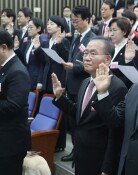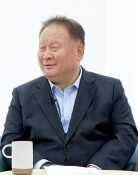Poll shows high public dissatisfaction with party politics
Poll shows high public dissatisfaction with party politics
Posted May. 01, 2014 06:55,
In a symbolic case indicating South Koreans` public distrust of politicians, condolence flowers sent by President Park Geun-hye, high-ranking government officials and politicians to the mourning altar for the victims in the deadly sinking of the ferry Sewol were taken away at the protest by the bereaved families.
The public trust over party politics was no exception. According to the result of a survey by the Korea Institute for Future Politics at Myongji University from February 20 to 27, about one of four Koreans (24.4 percent) were satisfied with the country`s party politics. Just 2.6 percent of the respondents said they were "very satisfied," while 19.3 percent said that they were "not satisfied at all."
Nearly 42 percent of respondents supporting the conservatives expressed satisfaction, while 13.3 percent of moderate and 19.8 percent of progressive-leaning respondents showed very low levels of satisfaction. Dissatisfaction with the party politics was higher among men, people in their 30s and those with higher incomes.
Asked if they thought Korean political parties represent citizens` voices well, just 28.1 percent said "yes."
To a question if they had ever voluntarily attempted to contact a political party or a politician, just over 16 percent of those polled said "yes." The percentages were higher among people in their 40s to 50s, with higher education and higher incomes.
The most common form of contact with political parties was party membership (35.8 percent) and participation in party rallies or events (35.8 percent), followed by volunteer work for election campaigns (26.5 percent), visits to the Internet homepages of parties or politicians (26.5 percent) and access to their social media sites (25.9 percent).
The more a person had contacts with political parties, the less satisfied they were with them, the survey suggested. Yoon Jong-bin, director of the institute, noted this suggests that Korean political parties have "failed to connect with the electorate in terms of quality."
Asked to write the name of Prime Minister Chung Hong-won, just 22.8 percent of those polled gave the right answer. Less than 15 percent of women and a mere 6.1 percent of people in their 20s got the answer right. The result shows that the prime minister`s presence is not visible very much despite President Park`s pledge to give more authority and responsibility to the prime minister.
The institute plans to hold a seminar based on the poll results Friday and have discussions over ways to connect citizens and parties to strengthen representative democracy.







